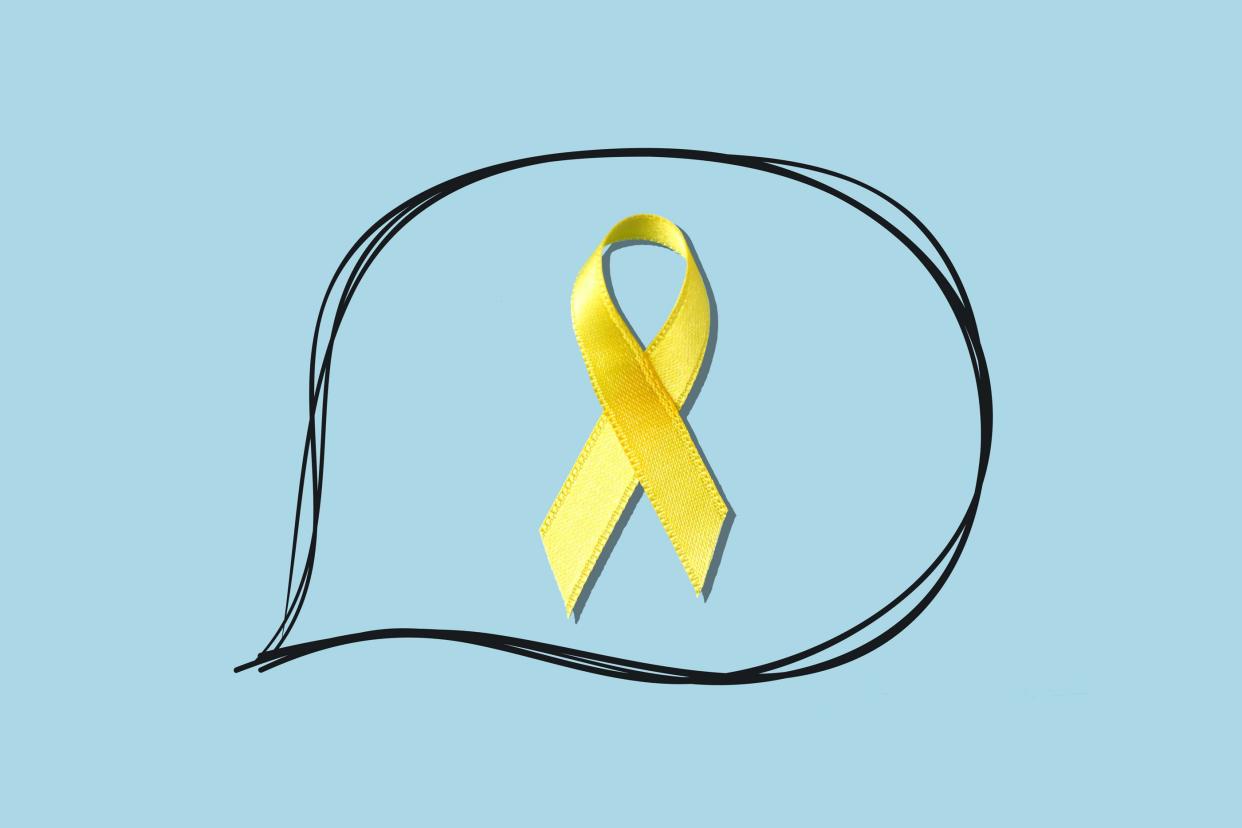How to Talk to Your Child About Suicide

Getty Images (2)
Suicide is a public health crisis. According to World Health Organization, more than 700,000 people die by suicide each year. That means one life is lost every 45 seconds—or 1,917 lives are lost each day. And while the cause of suicide is varied and complex—addiction, alcoholism, bullying, financial troubles, trauma, and mental illness have all been linked to suicide—it is an issue affecting both children and adults. Suicide is the second leading cause of death for adolescents and the fourth leading cause of death among individuals aged 35 to 44.
So what can we do to prevent suicide? We can talk about it with our family, friends, colleagues, peers, and children. (Yes, children.) Because talking about suicide removes the stigma surrounding it. It lifts the veil of secrecy. It also makes the topic accessible. If our children learn about suicide, they will know how to discuss the matter if and when they feel suicidal.
That being said, many parents are wary about broaching such a serious and sensitive topic. They believe that talking about suicide leads to suicide. But according to Alicia Raimundo, a mental health advocate and project manager of Foundry, an online health and wellness resource for teens and young adults aged 12 to 24, the opposite is true. Instead, these conversations help people dealing with thoughts of suicide understand that they can find support and they aren't alone in their thinking. "It also helps them see that they are loved and people want them to stay in their lives," adds Raimundo.
Where do you start? Here is the best way to approach the subject with your child regardless of their age.
How to Talk to Young Children About Suicide
While the American Academy of Pediatrics and the American Psychiatric Association recommend parents do not address tragedies until children are 8 years of age or older, there are exceptions. "If a child has been exposed to suicide, you need to talk to them about it, regardless of their age," says Lyn Morris, LMFT, senior vice president of clinical operations for Didi Hirsch Mental Health Services, which provides free help for mental health issues, substance use disorder, and suicide prevention.
For preschool- and kindergarten-aged children, it is important to stick to the basics. "I would recommend talking to them about someone passing from suicide like you would any other disease," says Raimundo. Use clear, concise words, like "I have some news to tell you. Uncle John died." Avoid details, encourage questions and feelings, and accept their reaction to the news. Some children will cry while others will seem indifferent. Both reactions are okay and normal.
For children aged 8 to 11, Raimundo suggests emphasizing the sadness of the death and giving them details they will understand. "Explain the act was caused by an illness called anxiety, depression, [addiction], or trauma," says Raimundo. Let them know these illnesses are treatable in most cases, but for some, mental illness can be fatal. And as with younger children, encourage any and all questions and feelings.
Dr. Gail Saltz, M.D., a psychiatrist and associate professor of psychiatry at the New York Presbyterian Hospital Weill-Cornell School of Medicine, points out a great way to initiate a mental health conversation is to discuss emotions. "It is never too early to talk about feelings, which is really a youth-based way to talk about mental health," says Dr. Saltz. Ask them if they feel sad, mad, or nervous. It's important for anyone, especially children, to be able to label what they feel, and be comfortable enough to open up about their emotions.
But if a young child is displaying warning signs, such as different sleeping patterns, changes in their behavior, or increased withdrawal, a different conversation is necessary. The American Foundation for Suicide Prevention recommends asking elementary-aged children how they feel, but taking it a step further. "If it seems to you that they feel hopeless, trapped, or overwhelmed then ask if they ever think about hurting themselves or ending their life," the organization shares on its website.
How to Talk to Teens About Suicide
By high school, many kids have been exposed to suicide—whether they've seen it spoken about on TV, had a person close to them struggle with it, or had suicidal thoughts themselves. The older they are, the more direct you need to be.
Ask your teen what they know about suicide. Gather information, present facts, and dispel any myths they may have heard, including the idea that those who take their own life are selfish and weak. Answer questions they may have without shame, judgement, or fear. It's also a good idea to help adolescents come up with a plan of what they'll say or do if the topic of suicide comes up in their social circles, because chances are the subject will, says Raimundo. Teach children the best way to support their friend is to ask an adult for help, even if it means going against their friend's wishes.
Always remind them help is available if they ever find themselves in that position. Validate their feelings by saying things like "That must be hard" or "It sounds like you're dealing with a lot." Suggest people or places they can turn to if they are ever having suicidal thoughts. Always keep in mind: "The best time to talk about suicide with your kids is when they're not in a crisis," says Morris.
If you or someone you know is having suicidal thoughts, please call the Suicide and Crisis Lifeline at 988, visit 988Lifeline.org or text "START" to 741-741 to immediately speak to a trained counselor at Crisis Text Line.

